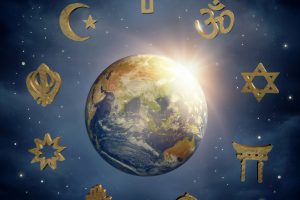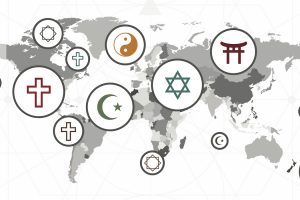
Andy Lewis is a Catholic who teaches Religious Education in St Bonaventure’s Catholic School in East London. He is the author of a number of student and teacher books, regular blogger and expert speaker at a range of regional and national teaching events.
Can you provide an overview of the Catholic faith?
The Catholic Church teaches that it is the one, holy, catholic and apostolic church founded by Jesus Christ. The bishops are seen as the direct successors of Christ’s apostles, with the pope as the successor to Saint Peter, upon whom primacy was conferred by Jesus Christ. It relies on three sources of authority – scripture (the Bible), tradition and magisterium (authority of bishops).
The Pope lives today in the Vatican City, an independent state found with the boundaries of Rome, Italy. There are nearly 1.5 billion Catholics around the world.
There are seven sacraments, with Eucharist being the ‘sacrament of sacraments’ and ‘source and summit’. The celebration of the Eucharist is usually referred to as the Mass, and Catholics will attend on a Saturday evening (Vigil) or Sunday morning. Some will attend daily. For Catholics, they believe that they are consuming the actual body and blood of Christ when they receive.
When did the observance of fasting originate in your faith?
The observance of fasting in the Catholic tradition is often said to have originated with Jesus when he spent 40 days in the wilderness and has a long-standing tradition in Christian spirituality. It is associated with turning away from sin and back to God; Jesus said that his disciples would fast after he had departed (Luke 5:35). Fasting is found throughout the Old Testament, and so comes from Jewish practice. Today it is included Canon Law (the law of the Catholic Church), making it an ‘obligation’ for practising Catholics.
When do you fast, and are there any rules?
There are two main types of fasting for Catholics. During Lent (in the lead up to Easter for 40 days), it is a time of prayer, almsgiving and fasting. The current tradition is that of giving up something considered a luxury – sweets, chocolate, alcohol. This is common for all Christians, and I even know nonreligious people who join this practice as they find it a healthy practice.
Catholics also fast on Ash Wednesday (the first day of Lent) and Good Friday – this leads to some Catholics, particularly including religious, fasting every Wednesday and Friday – the Daughters of Charity who I lived with in northern Ethiopia did for example. It is common to give money saved by fasting to the poor, and so CAFOD – a Catholic charity for overseas development – use it as a fundraiser, called Family Fast Day, each Lent and Advent.
The Bishops in England and Wales have reinstated Friday Abstinence (from Sept 2011) which is refraining from meat on a Friday (and dairy and alcohol for some). This led to the whole ‘fish on a Friday’ tradition – and a visit to the fish and chip shop! Fasting on Friday is an act of Penance, linking to the day of Jesus’ crucifixion. Some will do other acts of penance on a Friday instead of refraining from meat or fasting. Traditional fasting for Catholic involves one meal and two smaller meals (which together are less than one usual meal).
Many other Christians join in with these practices, and it is important to note that it varies around the world for Catholics – the Bishops for each conference (i.e. England and Wales, Scotland, Ireland) can make decisions about fasting, in particular abstinence.
The final period of fasting for Catholics is the one before receiving the Eucharist – and it is a requirement to not eat or drink for an hour before Mass.
What are the benefits and challenges of fasting?
Pope Benedict XVI once said ‘voluntary fasting enables us to grow in the spirit of the Good Samaritan, who bends low and goes to the help of his suffering brother.‘- we give of our surplus so that those in need may experience providence of God. It is also an opportunity to transform our vices into virtues, creating time and space for God in our hectic lives. We make our own small sacrifices and self-denial in order that we get closer to God. The specific things you give up have got to matter and be missed – that is part of the nature of a challenge, otherwise it is not a sacrifice. This has to be done for 40 days, which is a significant amount of time.
Why do you fast?
On a personal level, I try to build moments of self-sacrifice into my daily life – with great intensity and focus during days and times of fasting. What can I do without? What are my distractions? What stops me from being who God wants me to be? In our modern world, there is a lot more to cause distraction and temptation than the fasting Israelites about to embark on a long journey – therefore it may be harder, but perhaps more important now than ever before.



Add Comment